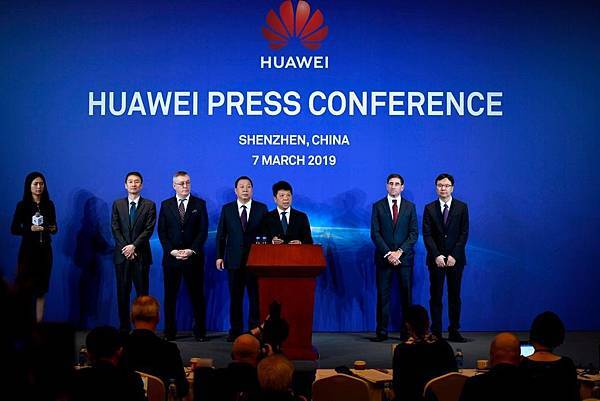
Guo Ping's Speech on the Huawei Press Conference on March 7, 2019
Good Morning, ladies and gentlemen, thank you for being here.
Today Huawei announced it has filed a lawsuit against the US government, to challenge the constitutionality of Section 889 of the 2019 National Defense Authorization Act, or "NDAA". Huawei seeks remedies including a declaratory judgment that the restrictions targeting Huawei are unconstitutional, and a permanent injunction against these restrictions.
The U.S. Congress has repeatedly failed to produce any evidence to support its restrictions on Huawei products. After exhausting all other means to allay the doubts of some U.S. lawmakers, we are left with no choice but to challenge the law in court. This ban not only is unlawful, but also harms both Huawei and US consumers.
Huawei operates in more than 170 countries and regions. As a leading global technology provider, Huawei has always taken its responsibilities seriously, specifically, the responsibility to make secure equipment that meets industry standards. For three decades, we have maintained a solid track record in cyber security. Huawei has not and will never implant backdoors. We will never allow others to install any in our equipment.
The U.S. Government has long branded Huawei a threat. It has hacked our servers and stolen our emails and source code. Despite this, the U.S. Government has never provided any evidence supporting their accusations that Huawei poses a cyber security threat. Still, the U.S. Government is sparing no effort to smear the company and mislead the public about Huawei. Even worse, the U.S. Government is trying to block us from the 5G markets in other countries.
Huawei has invested significantly to become the global leader of 5G. Given that the United States has never presented any evidence to substantiate its security allegations, we question its intent of not wanting other countries to use Huawei: is it afraid that other countries may catch up to and overtake it using our advanced 5G technologies?
Maybe the U.S. Government incorrectly believes it would benefit from the suppression of Huawei. But the truth is, restricting Huawei's contributions to American and other nations' 5G networks will only harm their national interests. Faster 5G network deployment can benefit all countries.
Regrettably, the NDAA was enacted to restrict Huawei without giving us an opportunity to defend ourselves.
Section 889 of the 2019 NDAA prevents us from serving our U.S. customers, damages our reputation, and deprives us of opportunities to serve customers outside the United States. It is an abuse of the U.S. lawmaking process. This section strips Huawei of its due process, violates the separation-of-power principle, breaks U.S. legal traditions, and goes against the very nature of the Constitution. Section 889 infringes upon our rights and harms U.S. consumers. In enacting the NDAA, Congress acted unconstitutionally as judge, jury and executioner.
Other countries are rightly resisting the U.S. Government's campaign against Huawei, and the U.S. President himself has recently questioned using artificial security reasons to block Huawei. If this law is set aside, as it should be, Huawei can bring more advanced technologies to the United States and help it build the best 5G networks. Huawei is willing to address the U.S. Government's security concerns. Lifting the NDAA ban will give the US Government the flexibility it needs to work with Huawei and solve real security issues.
We are compelled to take this legal action as a proper and last resort. We look forward to the court's verdict, and trust that it will benefit both Huawei and the American people.
Thank you!
女士們先生們,各位上午好!
今天,華為宣佈對美國政府提起訴訟,對《2019年國防授權法》(“NDAA”)第889條是否符合憲法規定發出挑戰。華為希望獲得如下救濟措施:法院判定NDAA中針對華為的限制措施違反憲法,同時頒發永久性禁令,禁止實施該限制措施。
美國國會一直未能向我們展示支援限制華為產品銷售的證據。在竭盡所能試著消除一些美國立法者的疑慮之後,華為別無選擇,只能在法庭上挑戰這一法律。該禁令不僅違法,還傷害了華為以及美國消費者。
華為在170多個國家開展業務,作為全球領先的技術提供商,華為的責任是遵從標準,製造安全的設備,我們一直認真履行自己的責任。過去三十年,我們擁有良好的網路安全紀錄。華為從來沒有,將來也不會植入後門。我們也絕不允許別人在我們的設備上這樣幹。
美國政府一直污蔑華為是威脅,還攻擊我們的伺服器,竊取郵件和原始程式碼,而且從來沒有提供任何證據支撐其關於華為是網路安全威脅的指控。
而且,美國竭力詆毀華為、影響公眾輿論。更糟糕的是,美國政府試圖阻止華為參與其他國家的5G網路建設。
通過高額投資,華為成為全球5G領導者。鑒於美國從未提供任何證據證明其安全指控,我們懷疑它不讓其他國家使用華為產品的動機到底是什麼:是不是擔心其他國家會使用先進的5G技術趕超美國?
或許美國政府錯誤地認為,壓制華為能使其從中受益。但事實是,限制華為參與美國和其他國家的5G網路建設只會損害這些國家的利益,而更快地部署5G網路會使所有國家受益。
令人遺憾地是,在我們沒有機會辯護的情況下,美國卻頒佈NDAA對華為進行限制。
2019 NDAA 889條不僅阻止華為向美國客戶提供服務,還損害我們的聲譽,讓我們失去為美國以外客戶提供服務的機會。這是對美國立法程式的濫用,剝奪了華為走正當法律程式的權利,有悖於三權分立原則,背離了美國的法律宗旨,違背了憲法制定者的初衷。這不但侵犯了華為的權利,也傷害了美國消費者。通過頒佈NDAA,美國國會扮演了法官、陪審團和執法者的角色,這是違憲的。
其他國家也在反對美國政府打壓華為的做法,美國總統本人最近也對使用虛假的安全理由來阻止華為的做法提出質疑。如果撤銷這條法律(本來就應當撤銷這條法律),華為就有機會向美國提供更加先進的技術,幫助美國建立最先進的5G網路。華為願意解決美國政府的安全擔憂。取消NDAA對華為的禁令可以讓美國政府與華為一起解決真正的網路安全問題。
採取法律行動是我們不得已而為之的最後選擇。我們希望,法院能做出對華為以及美國人民都有益的正確決定。
謝謝!
了解更多華為新聞: http://cn.nytimes.com/business/20190307/huawei-united-states-trade-lawsuit/zh-hant




 留言列表
留言列表
